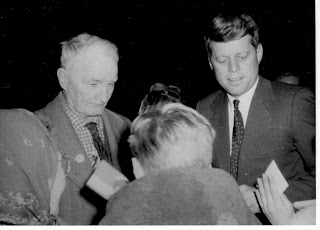February 5, 2012
JACK KENNEDY, ELUSIVE HERO: HARDBALL
Knoxville, Tennessee (JFK+50) Today JFK+50 reports on Chapter 11 of Chris Matthews' new book, Jack Kennedy, Elusive Hero, published by Simon & Schuster.
The title of Chapter 11 is HARDBALL.
To succeed at the national level, Chris says that JFK would "woo those he could," & "play hardball with" those who he couldn't.
In the meantime, Jack was re-elected to the senate in 1958 by a 3 to 1 margin & would use the voting results to plan strategy in the presidential race.
An "under the radar" organization was set up in Washington led by Jack's brother-in-law, Steve Smith.
The plan was to "build a fire" under the Democratic leaders "by appealing directly to voters & delegates."
Jack decided to run in Wisconsin, where he had a lead in the polls, rather than in Ohio, but the plan was to win there by playing hardball with Governor Mike DiSalle.
Chris writes that while Jack was courting the liberals & was beginning to call himself one, he, in reality, "hated liberals," at least according to Ben Bradlee.
And Jack also did not agree with the "Nixon-haters" of his party. He refused to join in with those who ridiculed the Vice-President & at one point said: "Nixon is a nice fellow in private & a very able man."
Charlie Bartlett recalled that Jack told him on New Year's Eve 1959 that if he didn't win the 1960 Democratic nomination, he would vote for Nixon.
JFK announced his candidacy in the Senate Caucus room on January 2, 1960.
Later that month, he sent Bobby to pay a personal visit to Governor DiSalle.
Bobby gave DiSalle an ultimatum: support Jack or else. DiSalle, Chris writes, was "furious," but endorsed Jack.
In March, Jack won the New Hampshire Primary as expected, but polls showed he was behind Hubert Humphrey in Wisconsin.
JFK in Reedsburg, Wisconsin
www.reedsburgwi.gov
Chris says that Jack used the poll data to his advantage by finding out "which arguments would win interest," a "breakthrough technique" that became common in modern campaigning.
While Jack's loudspeakers were playing Frank Sinatra's "High Hopes," with new lyrics designed for Jack, Humphrey's were playing "Davy Crockett."
Adding to Humphrey's woes, Jackie was speaking in Polish in an ethnic section of Milwaukee.
The final vote on April 5 was JFK 478,901, HHH 372,034.
West Virginia, a state with a Protestant population of 95%, was next. Joe Kennedy said he shouldn't run there but Jack responded: "I've got to."
Humphrey was ahead by 20 points in the polls. Democratic leaders thought Jack would lose & LBJ lobbied Tip O'Neill to support him should the convention go to a 2nd ballot.
Humphrey's campaign bus was playing "Give Me That Old Time Religion."
But while Catholic Al Smith, Democratic nominee in 1928, had avoided the religious issue, Jack Kennedy, Chris tells us, "jumped into (the issue) with both feet."
To counter the religious question, the Kennedy campaign put a major emphasis on JFK's war record. Humphrey was vulnerable there because he had been rejected for military service.
West Virginia was more to JFK, however, than hardball politics.
As future press secretary Pierre Salinger said, seeing firsthand the poverty in West Virginia "brought a real transformation of JFK as a person (&) changed his whole outlook on life."
JFK Speaking in West Virginia
JFK Library Photo
Also, Jack sold West Virginians on the argument that if he became president, he would not forget them.
On election night, Jack was back in Washington trying to enjoy an evening at the movies with the Bradlees when word came that he had won the West Virginia primary.
Jack Campaigns in West Virginia
JFK Library Banner
Chris concludes this chapter with a very interesting, yet melancholy, account about Jackie on that victory night. Why not pick up a copy of Chris's book & read that for yourself?



